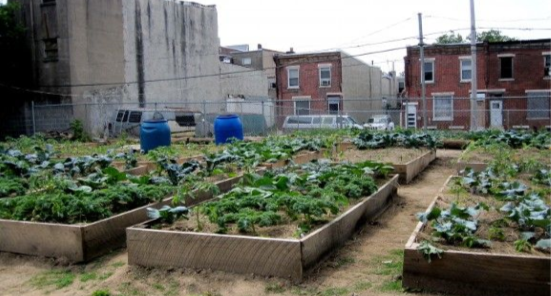
View our public comment on the Land Bank’s strategic plan.
Read the Land Bank’s draft strategic plan here.
Dear Mr. Cusano:
Thank for you for the opportunity to comment on the Philadelphia Land Bank’s draft 2019 Strategic Plan. My name is Ebony Griffin and I am a staff attorney at the Public Interest Law Center focusing on environmental justice and the Director of the Law Center’s Garden Justice Legal Initiative (GJLI). GJLI provides pro bono legal representation to growers in the Philadelphia region in efforts to preserve greenspace and access to fresh produce in low income and communities of color.
GJLI supports the Land Bank’s mission of facilitating the return of the numerous parcels of vacant land into productive reuse.
GJLI supports the Land Bank’s mission of facilitating the return of the numerous parcels of vacant land into productive reuse. Many of GJLI’s clients are working throughout the city to transform disinvested and abandoned properties into vibrant oasis, community gardens, and safe gathering spaces. Several of the recommendations outlined in the draft 2019 Strategic Plan would serve to increase greenspace in many neighborhoods in addition to rewarding the efforts of longterm residents who have been stewarding vacant land. Specifically, the Law Center supports the Land Bank’s goals to:
- increase transparency by updating the process for how people engage the Land Bank;
- develop a community outreach strategy which includes collaboration with external organizations; and
- streamline the side yard disposition process.
Our experience shows how necessary these changes are. We receive calls from many potential clients who are confused about the process for accessing vacant land in the City. Some have figured out the initial steps and have submitted expressions of interest (EOis) but did not receive responses, sometimes for several months and sometimes not at all. Another concern expressed by potential clients is that they do not fully understand the application requirements, with an often-expressed concern about encountering hidden costs.
While the Law Center appreciates the Land Bank’s commitment to a transparent process, it is difficult to assess the draft Strategic Plan without the Land Bank’s acquisition and disposition policies. The Strategic Plan provides insight on goals the Land Bank hopes to achieve throughout the year; however, the acquisition and disposition policies specify the parameters through which the Land Bank can achieve those goals as well as provide the community with information on what options they have for accessing vacant land. Ideally, the draft Strategic Plan and the draft acquisition and disposition policies would have been released and contemplated simultaneously.
Without the availability of the Land Bank’s acquisition and disposition policies, the draft Strategic Plan represents a snap shot of the whole picture of the Land Bank’s progress towards its mission. The estimated end use numbers in the draft are only as valuable as the policies for disposition of city owned land. If these disposition policies create barriers to equitable access, then the numbers themselves are inequitable.
Given how critical the language of these policies is, it is imperative that the Land Bank commit to allowing opportunity for public engagement in the form of stakeholder meetings and public hearings on the acquisition and disposition policies. This must occur before the acquisition and disposition policies are finalized. We look forward to continuing that conversation as those policies become available.
In efforts to realize the goals outlined above, we would like to publicly invite the Land Bank to become a partner in Vacant Land 215
In efforts to realize the goals outlined above, we would like to publicly invite the Land Bank to become a partner in Vacant Land 215 and utilize it as an opportunity to allow interested community members to apply for vacant land while simultaneously receiving information about the process. Currently, the Public Interest Law Center, in partnership with other garden advocates throughout the city including Soil Generation and the Neighborhood Gardens Trust, hosts at least four (4) of these community education events per year, and have been doing this program for at least 4 years, at various locations throughout the city. Vacant Land 215s, are excellent opportunities for members of the general public to learn their options as it relates to vacant land in the city. Another opportunity for partnership is fuller participation in GroundedinPhilly.org, an online resource for growers in the city. GroundedinPhilly.org acts as a “one stop shop” for growers with questions from accessing vacant land to the location of existing community gardens.
Again, thank you for the opportunity to testify today. We are excited about working together in the future to support our shared goals for Philadelphia.
Sincerely,
Ebony Griffin
Staff Attorney
